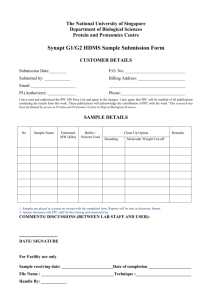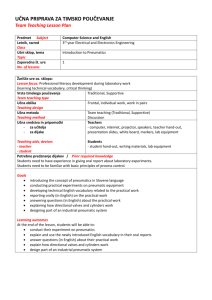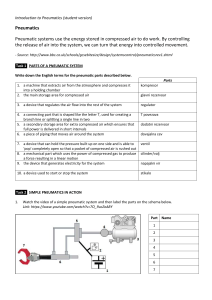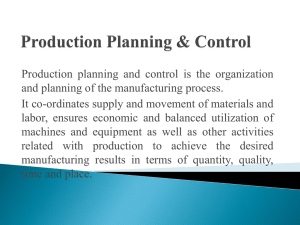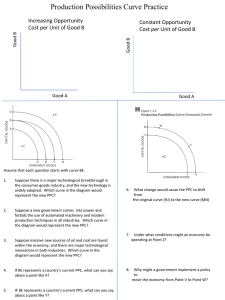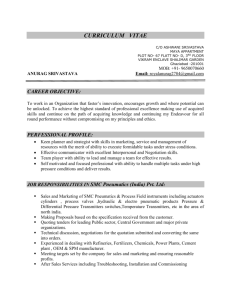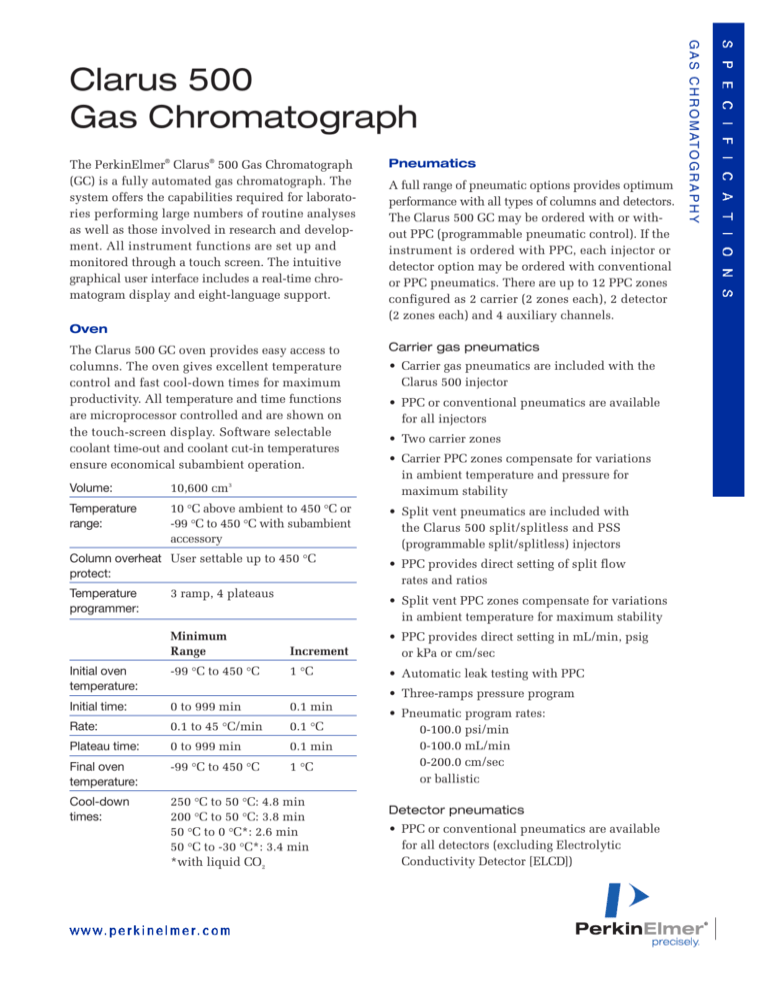
Pneumatics
A full range of pneumatic options provides optimum
performance with all types of columns and detectors.
The Clarus 500 GC may be ordered with or without PPC (programmable pneumatic control). If the
instrument is ordered with PPC, each injector or
detector option may be ordered with conventional
or PPC pneumatics. There are up to 12 PPC zones
configured as 2 carrier (2 zones each), 2 detector
(2 zones each) and 4 auxiliary channels.
Oven
The Clarus 500 GC oven provides easy access to
columns. The oven gives excellent temperature
control and fast cool-down times for maximum
productivity. All temperature and time functions
are microprocessor controlled and are shown on
the touch-screen display. Software selectable
coolant time-out and coolant cut-in temperatures
ensure economical subambient operation.
Carrier gas pneumatics
• Carrier gas pneumatics are included with the
Clarus 500 injector
• PPC or conventional pneumatics are available
for all injectors
• Two carrier zones
Volume:
10,600 cm3
• Carrier PPC zones compensate for variations
in ambient temperature and pressure for
maximum stability
Temperature
range:
10 °C above ambient to 450 °C or
-99 °C to 450 °C with subambient
accessory
• Split vent pneumatics are included with
the Clarus 500 split/splitless and PSS
(programmable split/splitless) injectors
Column overheat User settable up to 450 °C
protect:
Temperature
programmer:
3 ramp, 4 plateaus
• PPC provides direct setting of split flow
rates and ratios
• Split vent PPC zones compensate for variations
in ambient temperature for maximum stability
Minimum
Range
Increment
• PPC provides direct setting in mL/min, psig
or kPa or cm/sec
Initial oven
temperature:
-99 °C to 450 °C
1 °C
• Automatic leak testing with PPC
Initial time:
0 to 999 min
0.1 min
Rate:
0.1 to 45 °C/min
0.1 °C
Plateau time:
0 to 999 min
0.1 min
Final oven
temperature:
-99 °C to 450 °C
1 °C
Cool-down
times:
250 °C to 50 °C: 4.8 min
200 °C to 50 °C: 3.8 min
50 °C to 0 °C*: 2.6 min
50 °C to -30 °C*: 3.4 min
*with liquid CO2
• Three-ramps pressure program
www.perkinelmer.com
• Pneumatic program rates:
0-100.0 psi/min
0-100.0 mL/min
0-200.0 cm/sec
or ballistic
Detector pneumatics
• PPC or conventional pneumatics are available
for all detectors (excluding Electrolytic
Conductivity Detector [ELCD])
S P E C I F I C A T I O N S
The PerkinElmer® Clarus® 500 Gas Chromatograph
(GC) is a fully automated gas chromatograph. The
system offers the capabilities required for laboratories performing large numbers of routine analyses
as well as those involved in research and development. All instrument functions are set up and
monitored through a touch screen. The intuitive
graphical user interface includes a real-time chromatogram display and eight-language support.
G A S C H R O M ATO G R A P H Y
Clarus 500
Gas Chromatograph
• Four detector pneumatic zones
Injectors
• PPC provides direct setting in mL/min
The Clarus 500 GC supports a comprehensive array of
injectors that provides accuracy and precision to all of
your sampling applications. Up to two injectors may be
installed and operated simultaneously with independent
temperature control. Every injector is available with PPC
or conventional pneumatics.
• Detector PPC zones compensate for variations
in ambient temperature for maximum stability
Auxiliary pneumatics
• Four auxiliary zones
• PPC provides direct setting in mL/min, psig or kPa
• Auxiliary PPC zones compensate for variations in
ambient temperature for maximum stability
Packed-column injector
• Removable glass liner for trapping nonvolatile residues
• Adapter for on-column injection to wide-bore
capillary columns
Autosampler
• 50 °C to 450 °C in 1 °C increments
The Clarus 500 GC offers an optional, built-in syringe
autosampler for maximum sampling capabilities. All
control is accomplished through the keyboard or by a
data system such as TotalChrom®.
Injection speed:
Normal, fast, slow
Program modes:
Two methods may be programmed
Number of sample
positions:
82, plus one priority
Vial size:
2-mL (0.25 mL with insert) crimptop caps
2-mL screw-top caps
• 1/8-inch fitting
• 1/4-inch column adapter available
• Conventional pneumatics – choice of flow controller
with head-pressure gauge, or flow controller with
head-pressure gauge and digital display of flow
• PPC pneumatics – programmed flow or pressure
includes readout which displays pressure or
column flow
Split/splitless capillary injector
Number of waste
and wash vials:
Four waste and four wash
• Split ratio easily adjustable for a wide range of
analysis conditions
Waste and wash
vial size:
4 mL
• Charcoal trap in split vent prevents contamination
of split valve and lab air
Syringe size:
0.5 µL, 5.0 µL or 50.0 µL
Sampling volume:
0.1 µL to 0.5 µL from the 0.5-µL
syringe in 0.1-µL increments or
0.5 µL to 5.0 µL from the 5.0-µL
syringe in 0.5-µL increments or
5.0 µL to 50.0 µL from the 50.0-µL
syringe in 5.0-µL increments
• Two choices of liner: 2-mm and 4-mm internal diameter
• 50 °C to 450 °C in 1 °C increments
Viscosity settings:
0-15
Maximum number
of injections/vial:
15
Maximum number of 15
solvent postwashes:
Maximum number
of sample pumps:
• Conventional pneumatics – pressure regulator
(0-60 psig) for digital display of column head pressure.
Automatic control of split vent solenoid valve
• PPC pneumatics – four software configurable modes:
programmed flow, programmed pressure, programmed
velocity or constant flow. Vacuum compensation
software selectable
• PPC pneumatics include automatic control of split
vent by split flow or split ratio
15
Programmable on-column capillary injector
Maximum number
15
of sample prewashes:
Minimum sample
volume required:
5 µL when used with the
0.25-mL vial insert; 350 µL when
used with the 2-mL vial
Reproducibility:
< 0.5% RSD for packed columns
1% C9 in C7, 1 µL injected
2
• 1/16-inch fitting
• Temperature-programmable inlet
• Three-ramps temperature program
• Oven tracking mode for simple operation
• 50 °C to 500 °C in 1 °C increments
• Heating rate of 1 °C/min to 200 °C/min or ballistic
• 1/16-inch fitting
• Conventional pneumatics – choice of flow controller
with head-pressure gauge, or flow controller with
head-pressure gauge and digital display of flow
• PreVent isolation mode allows a septum change without
interrupting carrier flow. Perform maintenance on the
inlet WHILE chromatography is taking place.
• PPC pneumatics include readout which displays
pressure and column flow
• ProTect mode eliminates contamination by preventing
heavy components in the sample from reaching the
expensive and retentive chromatographic column.
Allows back flushing during chromatographic run.
PSS – programmable split/splitless
capillary injector
• Temperature-programmable inlet
• Large-volume injection of up to 50 µL with autosampler,
150 µL manually
• Three-ramps temperature program
• Oven tracking mode for simple operation with
on-column injection
• Split ratio easily adjustable for a wide range of
analysis conditions
• Three choices of liner available: 1-mm and 2-mm i.d.
and on-column
• Charcoal trap in split vent prevents contamination of
split valve and lab air
• MSVent™ mode allows changing of columns without
cooling and venting the Clarus 500 MS, reducing
instrument downtime, offering a significant time
savings. In addition, MSVent facilitates connection of
the vent to a second detector for dual signal capability,
providing greater flexibility and enhancing productivity.
Gas sampling valves
• Wide offering of 4-, 6-, 8- and 10-port valves
• Large range of valved systems and standard
analyzers available
• Keyboard controlled
• 1/16- or 1/8-inch fittings
• 50 °C to 500 °C in 1 °C increments
• Heating rate of 1 °C/min to 200 °C/min or ballistic
• 1/16-inch fitting
• Conventional pneumatics – pressure regulator (0-60 psig)
for digital display of column head pressure. Automatic
control of split vent solenoid valve
• PPC pneumatics – four software configurable modes:
programmed flow, programmed pressure, programmed
velocity or constant flow. Vacuum compensation
software selectable
• PPC pneumatics include automatic control of split vent
by split flow or split ratio
PreVent
• Unique PerkinElmer sample management system
Detectors
A wide choice of detectors optimized for sensitivity and
selectivity is available for use with the Clarus 500 GC.
All built-in detectors include an automated background
compensation feature that corrects for column bleed.
Whether you choose the Flame Ionization Detector, the
Thermal Conductivity Detector, the Electron Capture
Detector, and/or environmental-specific detectors, all
conform to the highest industry standards for reliability
and performance. Every detector except the Electrolytic
Conductivity Detector (ELCD) is available with PPC or
conventional pneumatics. Up to two detector modules
may be installed and operated simultaneously with
independent temperature and pneumatic control.
Flame Ionization Detector (FID)
• Available only on the Clarus 500 GC with PSS or
split/splitless capillary injector and PPC pneumatics
• Wide linear dynamic range
• Includes injector and detector restrictors
• No makeup gas required due to efficient sweeping
of column effluent by hydrogen combustion gas
• PreVent™ time-saver mode prevents higher boiling
components or residues from going through the
column and the detector.
• Air flow designed to minimize contamination and
residue buildup
• 1/8-inch fittings
• PreVent enhanced large-volume injection (ELVI)
mode isolates the column and detector from the
effects of high levels of solvent. Eliminate solvent
flooding of the column or allow the use of solvents
such as methylene chloride with an ECD.
• Conventional pneumatics – pressure regulator for
hydrogen, needle valve for air
• PPC pneumatics – software flow control of hydrogen
and air
• “Flame out” warning and ready interlock
Operating
temperature:
100 °C to 450 °C in 1 °C increments
Operating
temperature:
100 °C to 350 °C in 1 °C increments
Sensitivity:
> 0.015 coulombs/g C
Sensitivity:
9 µV/ppm nonane at 160 mA at the
bridge with a detector temperature
of 100 °C
Typically < 1 ppm nonane
Minimum
detectable
quantity:
-12
< 3 • 10 g C/sec nonane at a
S/N = 2 to 1
Linearity:
> 10
Signal filtration:
50, 200, 800 msec
Minimum
detectable
quantity:
Input range:
1, 20
Linearity:
> 105
Makeup gas:
Not required
Power supply:
Constant current with four
selectable settings:
1: ±40 mA
2: ±80 mA
3: ±120 mA
4: ±160 mA
• High operating temperature for maximum stability
Signal filtration:
50, 200, 800 msec
• 1/8-inch fittings
• Conventional pneumatics – needle valve for makeup gas
Filament
protection:
Self-limiting and resetting after
transient overloads in either channel
• PPC pneumatics – software flow control of makeup gas
Makeup gas:
Not required for 0.32- to 0.53-mm i.d.
columns with flows ≥ 5 mL/min
Required for 0.25-mm or smaller
i.d. columns
6
Electron Capture Detector (ECD)
• High sensitivity
• Excellent selectivity
Source:
15 mCi 63Ni
Temperature
protect:
470 °C by software
Carrier gas:
Either Ar/CH4 or N2
Photoionization Detector (PID)
Operating
temperature:
100 °C to 450 °C in 1 °C increments
Minimum
detectable
quantity:
< 0.05 pg perchloroethylene with
argon/methane or nitrogen
Special detector for water pollution analysis of samples
containing aromatic compounds.
• Internal power supply and lamp control
• Series operation kit available
Linearity:
> 10
• Can be combined with ELCD in a single
detector position
Signal filtration:
200, 800 msec
• 1/8-inch fittings
Makeup gas:
Standard
• Conventional pneumatics – needle valve for makeup gas
4
• PPC pneumatics – software flow control of makeup gas
Thermal Conductivity Detector (TCD)
Operating
temperature:
100 °C to 250 °C in 1 °C increments
(can be set to 350 °C for cleaning)
< 10 pg benzene
• Ideal for series operation
Minimum
detectable
quantity:
• 1/8-inch fittings
Linearity:
> 107
• Conventional pneumatics – reference gas
flow controller
Signal filtration:
50, 200, 800 msec
• PPC pneumatics – software flow control of reference gas
Input range:
1, 20
Makeup gas:
Standard
• Capillary-column compatible
• Proven constant current design
• Software protection to prevent filament burnout
UV source lamp: 10.2 eV
www.perkinelmer.com
4
Combination PID/ELCD
Flame Photometric Detector (FPD)
Specific detector for halogenated compounds.
• Clarus 500 GC controls solenoid valve for venting
• Clarus 500 GC software controls photo-multiplier
tube voltage
• Combined with PID in a single detector position
• Clarus 500 GC software linearizer for sulfur mode
• 1/8-inch fittings
• 1/8-inch fittings
• Conventional pneumatics – pressure regulator for
hydrogen reaction gas
• Conventional pneumatics – needle valve for hydrogen,
pressure regulator for air
Operating
temperature:
100 °C to 450 °C in 1 °C increments
• PPC pneumatics – software flow control of hydrogen
and air
Sensitivity:
5 • 10–13 g Cl/sec trihalomethanes
Operating
temperature:
250 °C to 450 °C in 1 °C increments
1 • 10–11 g S/sec thiophene
1 • 10–12 g P/sec tributylphosphate
Linearity:
6
> 10
Selectivity:
> 106 (Cl:Hydrocarbon)
Minimum
detectable
quantity:
Makeup gas:
Required for flows < 5 mL/min
Linearity:
Sulfur 102 (log-log)
Phosphorus 103
Nitrogen Phosphorus Detector (NPD)
Signal filtration:
50, 200, 800
• Modular design
Selectivity:
10,000:1 (S/C)
100,000:1 (P/C)
Makeup gas:
Not required
Signal filtration: 50, 200, 800 msec
• Change bead in less than one minute
• Prealigned bead
• Rapid conditioning, up and running in less than
two hours
• 1/8-inch fittings
• Conventional pneumatics – pressure regulator for
hydrogen, needle valve for air
• PPC pneumatics – software flow control of hydrogen
and air
Touch-screen graphical user interface
The touch-screen graphical user interface incorporates
a number of key features:
• Multi-language support (i.e. English, French, Italian,
German, Spanish, Japanese, Chinese and Russian)
• Real-time graphic display of chromatogram
Operating
temperature:
100 °C to 450 °C in 1 °C increments
Minimum
detectable
quantity:
5 • 10–13 g N/sec
2,4-dimethylaniline
5 • 10–14 g P/sec tributylphosphate
Linearity:
> 104
• Password protection
Signal filtration:
50, 200, 800 msec
• Graphical display of temperature and pneumatic
programs
Selectivity:
50,000:1 (N/C)
10:1 (P/N)
• Status-summary screen
Input range:
1, 20
Makeup gas:
Not required
• Injection countdown for manual injections
• Column pressure/flow/velocity calculator
• More upgradable firmware
• Preventative maintenance counter
• Log file
• Resolution: 240 x 320
• 256-color display
• Meaningful error/alarm messages
www.perkinelmer.com
5
Other Clarus 500 GC features
Physical details
• Recorder attenuation range from 1 to 65,536 in
binary steps
Power
requirements:
120 V ±10%, 50/60 Hz, 2.0 kVA*
230 V ±10%, 50/60 Hz, 2.0 kVA
* On an independent 20-amp line
Ambient
temperature:
10 °C to 32 °C
Ambient humidity:
80% maximum relative humidity
without condensation
Mean BTU output:
3400
Weight
GC:
Autosampler:
49 kg (108 lb)
4.5 kg (10 lb)
• Long-term battery backup of GC methods, autosampler
programs, flow and temperature-calibration data
• Software calibration of oven temperature and carrier
gas flow with PPC and conventional pneumatics
• Full instrument control via external computer
• Five stored methods
• Baseline compensation
26.3 in. (69 cm)
18.4 in. (47 cm)
30.3 in. (77 cm)
21.4 in. (55 cm)
• Auxiliary heated zone for accessory devices
28.4 in. (72 cm)
PerkinElmer Life and
Analytical Sciences
710 Bridgeport Avenue
Shelton, CT 06484-4794 USA
Phone: (800) 762-4000 or
(+1) 203-925-4602
www.perkinelmer.com
For a complete listing of our global offices, visit www.perkinelmer.com/lasoffices
©2006 PerkinElmer, Inc. All rights reserved. The PerkinElmer logo and design are registered trademarks of PerkinElmer, Inc. Clarus, PerkinElmer and TotalChrom are registered trademarks
and MSVent and PreVent are trademarks of PerkinElmer, Inc. or its subsidiaries, in the United States and other countries. All other trademarks not owned by PerkinElmer, Inc. or its
subsidiaries that are depicted herein are the property of their respective owners. PerkinElmer reserves the right to change this document at any time without notice and disclaims liability
for editorial, pictorial or typographical errors.
006665E_01
KG050604
Printed in USA

